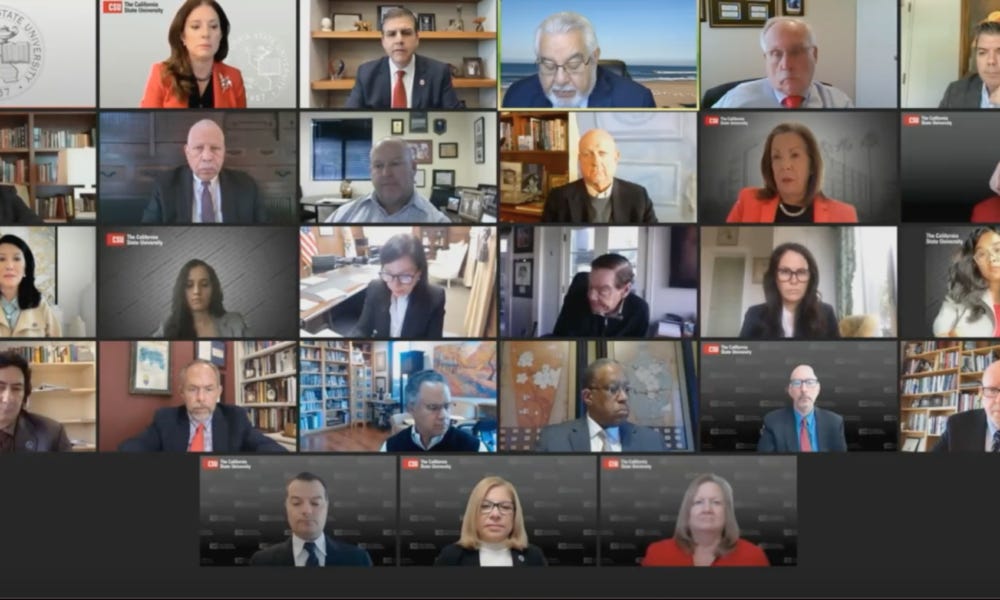Students call on CSU to defund university police, urge institutions to invest in mental health counseling services
This story for republication or reference was originally written by Fernando Haro of the Daily 49er. Recorded videos of the session are posted here.
LONG BEACH—Dozens of outraged students called for the California State University Board of Trustees to reallocate funds, including defunding university police and investing in more counseling and mental health services, during a meeting Tuesday.
During public comment, several concerns were raised by speakers who questioned the need for a multi-million-dollar police budget when campuses have been predominantly empty all year due to the coronavirus pandemic.
Nia Hall, a student at San Francisco State University and a member of Students for Quality Education, said that students across the state continue to struggle “physically, emotionally and financially while university police department officers continue to have salaries above that of full-time faculty and entire student resource centers.”
Hall said that officers on her campus do not serve the role of protecting the student body as they don’t prevent crime despite being militarized to an “absurd degree.”
In fact, according to the 2020 Annual Security Report by SFSU, on-campus crimes including stalking, fondling, domestic violence and rape all increased between 2017 and 2019.
“Officers, especially at San Francisco State, have become glorified meter maids,” Hall said. “We demand that the egregious amount of money being given to UPD be redistributed in the form of fee reimbursements, loan forgiveness, [to] resource centers and mental health counseling for students and underrepresented groups.”
Issues, including student mental health, housing, financial distress and accessibility to educational resources, have been overlooked by the trustees and the CSU system as a whole while police departments continue to be prioritized, Hall said.
“As the backbone of this entire system, students deserve the right to a higher education, free of systemic injustices that inhibit their learning and diminish their chance at a brighter future,” Hall said.
However, according to an email by Hazel Kelly, public affairs manager for the CSU, campus police are critical to maintaining a safe campus environment by enforcing federal and state laws, CSU regulations and establishing crime deterrence and prevention programs.
And it is up to each campus to determine its university police department’s budget, she said.
“The state of California doesn’t provide specific funding for university police department operations,” Kelly said. “Nor does the CSU request specific funding in the state budget for university police.”
During the meeting, speakers also felt there was a lack of priority among the trustees, who were criticized throughout public comment for the layoffs of hundreds of professors across the 23 CSU campuses over the last year while Chancellor Joseph I. Castro, who was elected back in September 2020, received a starting salary of $625,000, a 30.7% increase from his predecessor Timothy P. White.
Along with his salary, Castro also receives a $1,000 monthly auto allowance and a $7,917 monthly housing allowance.
Tanya Acosta, a student at California State University, Fresno and member of Students for Quality Education, called on Castro to reject his raise in order to help save jobs and student retention programs.
“Chancellor Castro took over a high leadership role during a time [of] financial crisis, food insecurity and housing, and mass evictions,” Acosta said. “How is this increase justified in the middle of a pandemic where students are literally going hungry and struggling to keep a roof over their heads.”
As for faculty and staff, the CSU is still threatening furloughs and pay cuts for the 2021-22 academic year, Acosta said.
Rich McGee, a council chair for the California State University Employees Union, asked the trustees how they could justify the layoff of hundreds of permanent staff employees across the CSU while citing a lack of funds as the reason when California Gov. Gavin Newsom recently announced a surplus budget.
“Imagine facing unemployment during this COVID-19 pandemic,” McGee said. “Those people would be happy to tell you what the sudden unemployment feels like, but they can’t tell you because they’re out looking for a job to feed their families.”
Maryana Khames, a student trustee since 2019, took time to thank the students and audience members who spoke during public comment and said having these conversations help the trustees understand the urgent need for mental health counseling and support services, especially during a pandemic.
In a unanimous vote, the trustees approved the 2021 Legislative Proposal, which will create the College Mental Health Services Program, intended to provide additional funding to mental health services within community colleges, the University of California and the CSU system.
The trustees also approved the CSU System Priorities for 2021 and 2022, listing their three priorities as restoring the Deferred Action for Childhood Arrival protections immediately to support Dreamers, securing the COVID-19 relief package from the federal government and increasing the maximum Pell Grant while restoring the annual cost-of-living increases to the program.
The CSU System Priorities will also aim to continue working with the K-12 system to ensure college readiness for students, invest in work-study programs, educate students for tomorrow’s workforce and address key societal issues through expansive research.




